Uganda. The King. Looking for a wife.
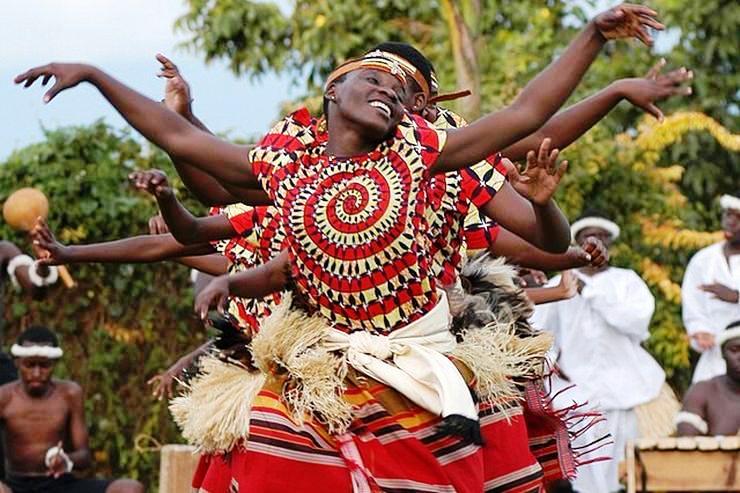
The marriage of the Kabaka of Buganda renews his royal status. We look at how the king goes through this process.
The Buganda Kingdom of the Baganda tribe, which is known to be the largest and most powerful traditional kingdom, is found in Central Uganda. Buganda Kingdom was founded in the 13th Century under the first king (Kabaka) Kato Kintu, it is a monarchy and the crown is hereditary. The kingdom is represented by 52 clans, which make up the Baganda tribe. According to tradition, the Kabaka has the right to marry any girl or woman he desires in the kingdom and a saying state, “Bazaana/muzaana wa Kabaka” which means the woman, or slave, of the Kabaka.It is said that in Buganda all women belong to the Kabaka, whether she is married or not is irrelevant. If the Kabaka desires a married woman, her husband is supposed to hand her to him gladly and also be proud that his wife has been chosen by the Kabaka.
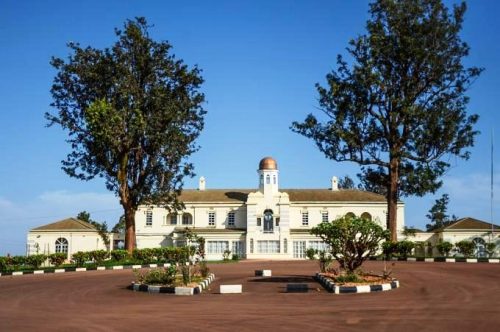
The Kabaka Palace in Kampala. CC BY-SA 3.0/ NatureDan
In Buganda, clan members are not necessarily related by blood but they are considered relatives so the Kabaka cannot marry anyone from his mother’s clan nor can he marry a woman from the Bbalagira (Royal) clan which is his clan and he is also not allowed to marry any Naava (daughter of a mumbejja – Princess) because that would be considered incest, which is an abomination in Buganda.
In the past the Kabaka of Buganda had many women, some were captured as prisoners of war and brought to the Kabaka. He would choose the women he desired and they would then be given to him as gifts. Some of his Bataaka (officers) would also offer him their daughters as gifts because they wanted to be in-laws (Baako) of the Kabaka.
Apart from all his women and concubines, he was supposed to have an official wife who is called the Nnabagereka (Chief wife). The marriage of the Kabaka differs from the one of his subjects or the Bakoopi (commoners) as they are referred to.
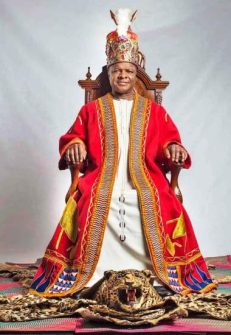
His Majesty Kabaka Ronald Muwenda Mutebi II. Photo Kabaka Office
There are a few rituals and customs carried out before the Kabaka can get his Nnabagereka. First of all, a young girl has to be identified by either the Katikiro (Prime Minister) or one of his confidants living in the Lubiri (Palace) but the Kabaka can also choose one of his own likings. As a matter of fact, the current Nnabagereka, Lady Sylvia Nagginda, from the Muusu clan (edible rat clan), was chosen by the Kabaka himself. The first requirement for the future Nnabagereka is that she must be a virgin.In the past, once the date and day of Kabaka’s marriage was announced, all his subjects all over the kingdom were supposed to abstain from sex with their wives and lovers until the Kabaka had gotten married and consummated his marriage after which the ban was lifted.
The current Kabaka Ronald Maenad Mutebi is a modern-day Kabaka and he did not impose this ban on his subjects. After the girl has been chosen for marriage to the Kabaka, the Kkatikiro and the Bambejja (princesses) will do what they call okulinga (the first visit to the would-be Nnabagereka’s family).
For the Bakoopi this first visit is referred to as Okukyala. The reasons for the Kkatikiro and Bambejja’s visit to the girl’s parents are, to ensure that the girl is fit to be the official wife of the Kabaka and also to see the kind of family the Kabaka would be marrying into. They then return to the Kabaka with the report and if the girl is approved of, another visit is made to the girl’s parents to bring them gifts.
Okulalira takes place when the Kkatikiro and his entourage return to the girl’s home carrying special gifts. The gifts are referred to as endalira.
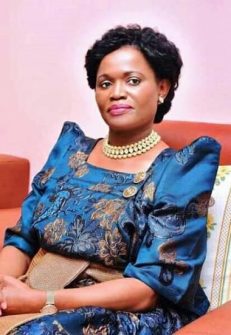
Her Royal Highness the Nnabagereka (Queen) Sylvia Nagginda. Photo Queen Office
In Buganda no cows are given as gifts because they don’t have them but if the Kabaka does have cows, some are sent to the girl’s parents along withbales of bark clothes (embuggo), animal skins, some of his subordinates (who would then become servants of the girl’s parents) and other gifts preferred by him.After the gifts are taken to the girl’s parents the entourage returns to the palace and only on the third visit, is the girl taken to the palace, this visit is referred to as Okunenya (blaming).
During the visit the Kkatikiro and his entourage teasingly accuse the girl’s family of hiding the Kabaka’s wife, saying that she is amongst their daughters and they have no business hiding her in their home, so the entourage pretends to look for the girl and when she is found they then return with her to the Palace.
While all this is happening, the Kabaka also performs some rituals and customs before the marriage date. He visits his mother’s palace and this act is called Okukyala, (the Queen mother is referred to as Nnamasoole), according to tradition, the King and Nnabagereka don’t live together in the same palace in Buganda.
At the Nnamasole’s palace, his maternal uncles will be waiting for him but the Nnamasole leaves because, among the Baganda, parents don’t attend the traditional marriages when children are getting married. His father is not mentioned here because in Buganda the title of Kabaka can only be inherited when the father passes.
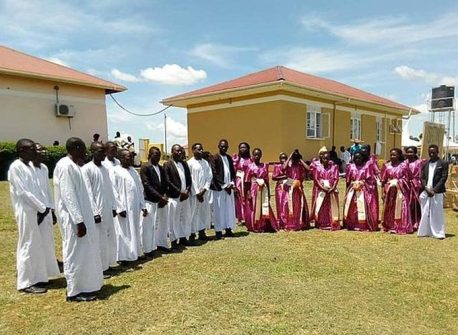
Baganda people in their cultural outfits. Men put on Kanzu, and ladies Gomesi. CC BY-SA 4.0/ Vincent kayondo.
His uncles will give him an honor called Mondo (wild cat) and he will also be advised on good governance. This advice is not only wisdom from the uncles but also closely linked to the ancestral spirits.
After Kukyala, the Kabaka performs another ritual known as okuvuma Kabaka. He is taken to amasiiro (royal tombs) and he is made to sit by his father’s grave, his uncles will give him more advice on how to treat the princes and princesses and also how to care for the Kingdom.
After the Kabaka has gone through all this, Mugema who is the person who crowns the Kabaka in Buganda and is also considered the grandfather of Buganda comes in and gives the king an ablution, a ritual cleansing, because the marriage of Kabaka is like a renewal
of his coronation.

View of Kampala. Buganda is the largest of the traditional kingdoms in modern-day East Africa, covering the central region of Uganda, including the Ugandan capital, Kampala. File swm
Before Christianity arrived in Uganda, the Buganda kingdom was originally built on the traditional Kiganda religion where they believed in ancestral spirits and worshipped many gods. The Kabaka is considered to be a spirit and human too so on the day of the marriage ceremony, a young virgin girl, called Nnaku, from the Enkima clan (Monkey clan) is brought in to represent the wife of the Kabaka’s spirit.
Nnaku is expected to remain a virgin for the rest of her life until she dies. Kabaka Mutebi’s Nnaku was eight years old at the time of his marriage in 1999.
After Mugema has performed his duty, a big feast is organized in the evening and the celebration of the king’s marriage begins.
In the celebration, the princesses are the main people celebrating, and there will be drumming and singing and dancing and food will be served. The Kabaka is seated holding a shield, in Buganda the shield symbolizes protection which is why the king will hold it during this celebration, he is protecting his family – the Buganda Kingdom.
When Kabaka Daudi Chwa II inherited the crown after his father’s death, Christianity was already introduced in Buganda so after his traditional wedding, he was the first king to take his bride (Nnabagereka) to church for matrimony and since then, after the traditional marriage of the Kabaka, everyone goes to the Anglican church for holy matrimony.
Kabaka Ronald Muwenda Mutebi was wed in holy matrimony with Lady Sylvia Nagginda, the current Nnabagereka of Buganda, on 27th August 1999 at St. Paul’s Cathedral Namiremba. (Open Photo: Buganda traditional dance. CC BY-SA 4.0/Tashoya)
Irene Lamunu



